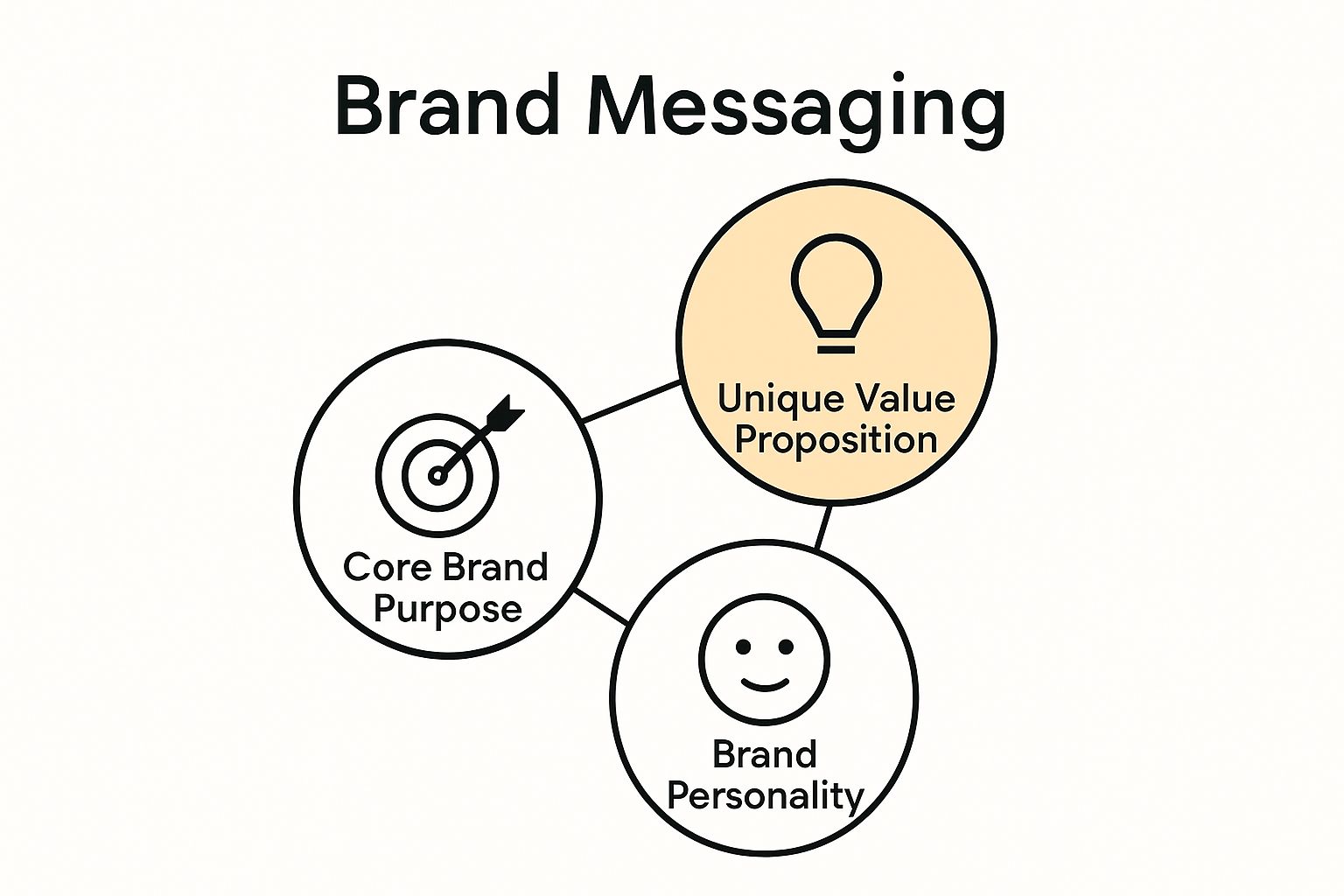What Is Rebranding and Why It Matters

Discover what is brand messaging and why it’s crucial for crafting your business identity. Learn its components and functions for effective branding.

Brand messaging sounds like it is all about catchy slogans or clever taglines. Turns out that is just scratching the surface. Customers form impressions within seconds, and your brand messaging instantly shapes how they see you. The real secret is that the stories and values behind your words do the heavy lifting for trust and loyalty before you ever make a sale.
Brand messaging represents the foundational communication strategy that defines how a business communicates its core value proposition, personality, and unique identity to its target audience. At its essence, brand messaging goes far beyond catchy slogans or marketing taglines—it’s a comprehensive narrative that encapsulates what your business stands for, why it exists, and how it solves problems for your customers.
Understanding what is brand messaging requires viewing it as a strategic framework with multiple interconnected elements. Think of brand messaging like an intricate communication blueprint that guides every interaction your business has with potential customers. This blueprint includes several critical components that work together to create a cohesive and compelling brand narrative.
The table below summarizes the core components of effective brand messaging, providing clear definitions to help readers quickly understand each key concept and its role in shaping your brand’s narrative.
| Component | Definition |
|---|---|
| Core Brand Purpose | The fundamental reason your business exists beyond making money |
| Unique Value Proposition | What sets your offering apart from competitors |
| Brand Personality | The human characteristics and emotional tone reflected in your brand communication |
| Clarity and Authenticity | Straightforward, transparent communication that truly represents your brand’s essence |
| Emotional Intelligence | Crafting messages that connect to customer aspirations, challenges, and values |
| Consistency | Maintaining a uniform tone and message across all communication channels |

Your brand messaging must authentically represent your company’s core values and speak directly to your target audience’s needs and aspirations. This means developing a consistent communication style that remains true to your brand’s fundamental identity while being flexible enough to engage different segments of your market. Learn more about brand positioning strategies can help you refine this crucial aspect of your brand communication.
The most effective brand messaging creates an emotional connection, transforming transactional interactions into meaningful relationships. It should feel genuine, clear, and powerful—capable of instantly communicating what makes your business special and why customers should care. By strategically aligning your messaging across all platforms and touchpoints, you create a unified brand experience that builds trust, credibility, and long-term customer loyalty.
Brand messaging serves as a critical strategic asset that can transform how potential customers perceive and interact with your business. It goes beyond simple communication—it becomes the foundational narrative that differentiates your organization in a crowded marketplace, driving meaningful connections and sustainable growth.
In a world where consumers are bombarded with countless marketing messages daily, powerful brand messaging becomes your strategic weapon for standing out. Your unique communication approach allows you to cut through the noise and establish a memorable identity that resonates with your target audience. Differentiation is not just about being different, but about being strategically distinct in ways that matter to your potential customers.
Effective brand messaging acts as a powerful psychological bridge between your business and your audience. When your messaging authentically reflects your brand’s values and speaks directly to customer needs, you create more than just transactional interactions—you build relationships. Explore our guide on strategic brand positioning to understand how deep, meaningful communication can transform casual customers into passionate brand advocates.
By consistently delivering a clear, compelling message across all touchpoints, you signal professionalism, reliability, and authenticity. This approach not only attracts potential customers but also fosters long-term loyalty. Customers do not just buy products or services—they buy into narratives, promises, and experiences that align with their own beliefs and aspirations.
 Your brand messaging becomes the vehicle through which you communicate these deeper, more meaningful connections.
Your brand messaging becomes the vehicle through which you communicate these deeper, more meaningful connections.
Customer perception represents a complex psychological framework where brand messaging plays a pivotal role in shaping expectations, emotions, and purchasing decisions. Your communication strategy serves as a powerful lens through which potential customers interpret your business’s value, reliability, and authenticity.
The table below highlights how effective brand messaging influences customer perception by outlining key psychological factors and describing their impact during customer interactions.
| Psychological Factor | Description |
|---|---|
| Emotional Triggers | Messaging stimulates emotions, fostering strong connections and influencing decisions |
| Trust Signals | Communication conveys credibility, reliability, and expertise |
| Narrative Impact | Storytelling creates memorable impressions that stick with customers |
| Value Alignment | Messaging aligns with customer beliefs and aspirations, deepening brand relationships |
Brand messaging operates at the intersection of emotional intelligence and strategic communication. When crafted thoughtfully, your messaging triggers specific psychological responses that go beyond rational decision-making. Customers form impressions within seconds, and your brand messaging becomes the primary tool for creating those crucial first moments of connection.
Trust emerges from the alignment between what your brand promises and how it consistently delivers those promises. Your messaging must communicate reliability, expertise, and genuine understanding of customer needs. Learn more about building brand trust can provide deeper insights into creating meaningful connections that transform casual interactions into long-term relationships.
Customers unconsciously evaluate every interaction through the lens of your brand’s messaging. When your communication feels authentic, transparent, and aligned with their personal values, you create a powerful psychological bond that transcends traditional transactional relationships. Your brand becomes more than a service or product—it becomes a trusted partner in solving their challenges and fulfilling their aspirations.
Brand messaging is not a one-size-fits-all strategy, but a nuanced approach that requires strategic thinking and deep understanding of your business’s unique identity. The most compelling brand messages are crafted with precision, intentionality, and a clear understanding of what truly resonates with your target audience.
At the core of powerful brand messaging lies an unwavering commitment to clarity and authenticity. Your communication must be straightforward, transparent, and genuinely reflective of your brand’s true essence. This means eliminating industry jargon, complex language, and ambiguous statements that might confuse or alienate potential customers.
Successful brand messaging transcends mere information delivery—it creates an emotional connection that speaks directly to your audience’s aspirations, challenges, and core values. Discover strategies for emotional brand connection can help you develop messaging that truly resonates on a deeper psychological level.
The most effective brand messages understand and articulate not just what your business does, but why it matters. This means connecting your product or service to broader human experiences and demonstrating how your brand can meaningfully improve customers’ lives. By aligning your messaging with genuine human needs and emotions, you transform your communication from a transactional interaction to a powerful narrative of shared values and mutual understanding.
Brand messaging becomes most powerful when transformed from theoretical concept to tangible communication strategy. Real-world examples demonstrate how thoughtful, strategic messaging can create profound connections with audiences, transcending traditional marketing approaches and establishing meaningful brand identities.
Successful brand messaging is fundamentally about telling a compelling narrative that goes beyond product features. The most impactful brand stories create emotional resonance by connecting personal experiences with broader human aspirations. These narratives communicate not just what a business does, but why it exists and how it makes a meaningful difference in customers’ lives.
Companies that excel in brand messaging understand the delicate balance between being distinctive and remaining relatable. Their communication strategies are carefully crafted to highlight unique value propositions while speaking directly to audience needs and desires. Learn more about strategic brand communication can provide additional insights into developing nuanced messaging frameworks.
The most effective brand messages transform ordinary interactions into extraordinary experiences. They do more than inform—they inspire, motivate, and create lasting impressions that extend far beyond immediate transactional relationships. By consistently delivering messages that are clear, authentic, and emotionally intelligent, businesses can build robust brand identities that resonate deeply with their target audiences.
Are you feeling frustrated by an inconsistent brand message that leaves customers uncertain about what sets your business apart? If you find that your communication is scattered or fails to build real trust, you are not alone. Many entrepreneurs struggle to connect their brand’s core purpose and value proposition to a clear narrative that truly resonates. As discussed in this article, long-term growth requires more than catchy taglines. It calls for clarity, emotional connection, and a unified strategy that matches your vision to what your audience actually needs.

It is time to move from confusion to clarity. Get the step-by-step support you need by exploring Reasonate Studio’s Aligned Impact Model™. Our proven process starts by uncovering your brand foundations—like messaging, personality, and positioning—then builds out a complete system for visibility and measurable results. Whether you want to scale your side hustle or elevate an established brand, unlock actionable solutions now and set your business apart. Take the first step toward a brand story that truly resonates—because your next level deserves a message with impact.
Brand messaging is a strategic communication framework that defines how a business conveys its core values, personality, and unique identity to its target audience through various narratives and interactions.
Brand messaging differentiates your business in a crowded marketplace, enhances customer engagement, builds trust, and fosters long-term loyalty by creating meaningful connections with your audience.
Key components include the core brand purpose, unique value proposition, brand personality, and a clear and authentic communication style that resonates with the target audience’s needs and aspirations.
Brand messaging shapes customer perceptions by creating emotional triggers and trust signals that help potential customers form impressions and expectations about a business’s reliability and authenticity.